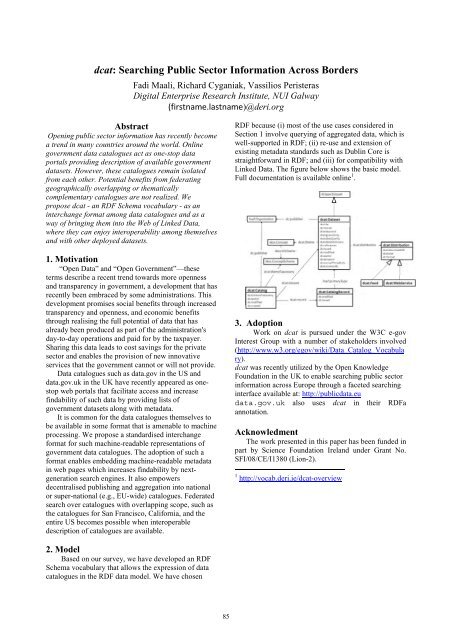NUI Galway – UL Alliance First Annual ENGINEERING AND - ARAN ...
NUI Galway – UL Alliance First Annual ENGINEERING AND - ARAN ...
NUI Galway – UL Alliance First Annual ENGINEERING AND - ARAN ...
You also want an ePaper? Increase the reach of your titles
YUMPU automatically turns print PDFs into web optimized ePapers that Google loves.
dcat: Searching Public Sector Information Across Borders<br />
Abstract<br />
Opening public sector information has recently become<br />
a trend in many countries around the world. Online<br />
government data catalogues act as one-stop data<br />
portals providing description of available government<br />
datasets. However, these catalogues remain isolated<br />
from each other. Potential benefits from federating<br />
geographically overlapping or thematically<br />
complementary catalogues are not realized. We<br />
propose dcat - an RDF Schema vocabulary - as an<br />
interchange format among data catalogues and as a<br />
way of bringing them into the Web of Linked Data,<br />
where they can enjoy interoperability among themselves<br />
and with other deployed datasets.<br />
1. Motivation<br />
“Open Data” and “Open Government”—these<br />
terms describe a recent trend towards more openness<br />
and transparency in government, a development that has<br />
recently been embraced by some administrations. This<br />
development promises social benefits through increased<br />
transparency and openness, and economic benefits<br />
through realising the full potential of data that has<br />
already been produced as part of the administration's<br />
day-to-day operations and paid for by the taxpayer.<br />
Sharing this data leads to cost savings for the private<br />
sector and enables the provision of new innovative<br />
services that the government cannot or will not provide.<br />
Data catalogues such as data.gov in the US and<br />
data.gov.uk in the UK have recently appeared as onestop<br />
web portals that facilitate access and increase<br />
findability of such data by providing lists of<br />
government datasets along with metadata.<br />
It is common for the data catalogues themselves to<br />
be available in some format that is amenable to machine<br />
processing. We propose a standardised interchange<br />
format for such machine-readable representations of<br />
government data catalogues. The adoption of such a<br />
format enables embedding machine-readable metadata<br />
in web pages which increases findability by nextgeneration<br />
search engines. It also empowers<br />
decentralised publishing and aggregation into national<br />
or super-national (e.g., EU-wide) catalogues. Federated<br />
search over catalogues with overlapping scope, such as<br />
the catalogues for San Francisco, California, and the<br />
entire US becomes possible when interoperable<br />
description of catalogues are available.<br />
2. Model<br />
Based on our survey, we have developed an RDF<br />
Schema vocabulary that allows the expression of data<br />
catalogues in the RDF data model. We have chosen<br />
Fadi Maali, Richard Cyganiak, Vassilios Peristeras<br />
Digital Enterprise Research Institute, <strong>NUI</strong> <strong>Galway</strong><br />
(firstname.lastname)@deri.org<br />
85<br />
RDF because (i) most of the use cases considered in<br />
Section 1 involve querying of aggregated data, which is<br />
well-supported in RDF; (ii) re-use and extension of<br />
existing metadata standards such as Dublin Core is<br />
straightforward in RDF; and (iii) for compatibility with<br />
Linked Data. The figure below shows the basic model.<br />
Full documentation is available online 1 .<br />
3. Adoption<br />
Work on dcat is pursued under the W3C e-gov<br />
Interest Group with a number of stakeholders involved<br />
(http://www.w3.org/egov/wiki/Data_Catalog_Vocabula<br />
ry).<br />
dcat was recently utilized by the Open Knowledge<br />
Foundation in the UK to enable searching public sector<br />
information across Europe through a faceted searching<br />
interface available at: http://publicdata.eu<br />
data.gov.uk also uses dcat in their RDFa<br />
annotation.<br />
Acknowledment<br />
The work presented in this paper has been funded in<br />
part by Science Foundation Ireland under Grant No.<br />
SFI/08/CE/I1380 (Lion-2).<br />
1 http://vocab.deri.ie/dcat-overview
















